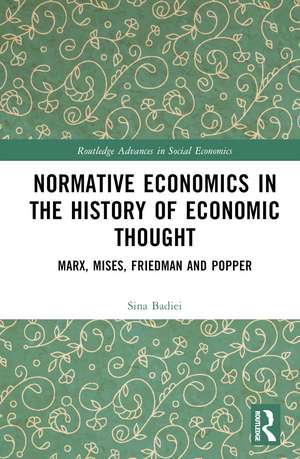Normative Economics in the History of Economic Thought: Marx, Mises, Friedman and Popper: Routledge Advances in Social Economics
Autor Sina Badieien Limba Engleză Hardback – 21 iun 2024
The book shows that while distinguishing positive from normative economics can be helpful, this distinction should not minimize the importance of normative economics or reject the possibility of offering objective evaluations of social phenomena and policies in normative economics. The book offers a critical assessment of the attempts by Marx, Mises and Friedman to reduce scientific economics to the positive analysis of social phenomena alone. Through a meticulous analysis of their work, the book shows that their positive theories fail to justify their evaluations of economic phenomena and policies. The book then draws on the writings of Popper to maintain that we should place normative economics at the center of economics. The book argues that normative economics can choose the norms underlying its evaluations of social situations and policies objectively and relies on some of Popper’s ideas to offer some criteria that can facilitate the selection of these norms.
The book will be of interest to economists, historians of economic thought, philosophers of economics and political theorists and philosophers.
Din seria Routledge Advances in Social Economics
-
 Preț: 641.33 lei
Preț: 641.33 lei -
 Preț: 386.77 lei
Preț: 386.77 lei -
 Preț: 310.08 lei
Preț: 310.08 lei - 18%
 Preț: 981.91 lei
Preț: 981.91 lei -
 Preț: 389.27 lei
Preț: 389.27 lei -
 Preț: 456.77 lei
Preț: 456.77 lei -
 Preț: 413.31 lei
Preț: 413.31 lei -
 Preț: 481.07 lei
Preț: 481.07 lei -
 Preț: 279.96 lei
Preț: 279.96 lei -
 Preț: 481.07 lei
Preț: 481.07 lei -
 Preț: 382.87 lei
Preț: 382.87 lei -
 Preț: 463.44 lei
Preț: 463.44 lei - 17%
 Preț: 222.06 lei
Preț: 222.06 lei -
 Preț: 478.02 lei
Preț: 478.02 lei -
 Preț: 479.27 lei
Preț: 479.27 lei -
 Preț: 408.71 lei
Preț: 408.71 lei - 18%
 Preț: 985.71 lei
Preț: 985.71 lei -
 Preț: 461.48 lei
Preț: 461.48 lei - 15%
 Preț: 418.48 lei
Preț: 418.48 lei -
 Preț: 460.52 lei
Preț: 460.52 lei - 17%
 Preț: 257.68 lei
Preț: 257.68 lei - 17%
 Preț: 269.39 lei
Preț: 269.39 lei - 13%
 Preț: 337.39 lei
Preț: 337.39 lei - 15%
 Preț: 420.83 lei
Preț: 420.83 lei -
 Preț: 440.02 lei
Preț: 440.02 lei -
 Preț: 441.89 lei
Preț: 441.89 lei -
 Preț: 377.84 lei
Preț: 377.84 lei - 18%
 Preț: 1364.18 lei
Preț: 1364.18 lei - 18%
 Preț: 1042.36 lei
Preț: 1042.36 lei
Preț: 1043.32 lei
Preț vechi: 1272.34 lei
-18% Nou
Puncte Express: 1565
Preț estimativ în valută:
199.67€ • 208.01$ • 166.01£
199.67€ • 208.01$ • 166.01£
Carte tipărită la comandă
Livrare economică 10-24 februarie 25
Preluare comenzi: 021 569.72.76
Specificații
ISBN-13: 9781032423395
ISBN-10: 1032423390
Pagini: 330
Dimensiuni: 156 x 234 mm
Greutate: 0.64 kg
Ediția:1
Editura: Taylor & Francis
Colecția Routledge
Seria Routledge Advances in Social Economics
Locul publicării:Oxford, United Kingdom
ISBN-10: 1032423390
Pagini: 330
Dimensiuni: 156 x 234 mm
Greutate: 0.64 kg
Ediția:1
Editura: Taylor & Francis
Colecția Routledge
Seria Routledge Advances in Social Economics
Locul publicării:Oxford, United Kingdom
Public țintă
PostgraduateCuprins
1. Introduction PART I. MARX’S NONNORMATIVE CRITIQUE OF CAPITALISM 2. Marx’s Concept of Value: The Value of Work or the Value of Working Time? 3. Marx’s Distinction between Productive and Unproductive Labor 4. The Transformation of Values into Production Prices 5. The Law of the Tendential Fall in the Rate of Profit 6. The Epistemological Foundations of Marx’s Theory PART II. MISES’S NONNORMATIVE DEFENCE OF LAISSEZ-FAIRE 7. The Apriorist Science of Human Action 8. Economics as a Branch of Praxeology 9. A Critical Evaluation of Mises’s Economic Theory and Apriorist Epistemology PART III. THE RELATIONSHIP BETWEEN POSITIVE AND NORMATIVE ECONOMICS IN FRIEDMAN 10. The Methodology of Positive Economics 11. Predictions and Freedom in Friedman’s Normative Thought PART IV. POSITIVE ECONOMICS AND NORMATIVE ECONOMICS IN POPPER 12. What Epistemology for Positive Social Science? 13. Toward a Popperian Normative Economics 14. Conclusion
Notă biografică
Sina Badiei is Junior Lecturer and Senior SNSF Researcher at the Walras-Pareto Center of the University of Lausanne, Switzerland, and Program Director in the Philosophy and Human Science Department at the Collège International de Philosophie in Paris, France.
Descriere
This book examines the role of normative economics in the writings of Karl Marx, Ludwig von Mises, Milton Friedman and Karl Popper.
